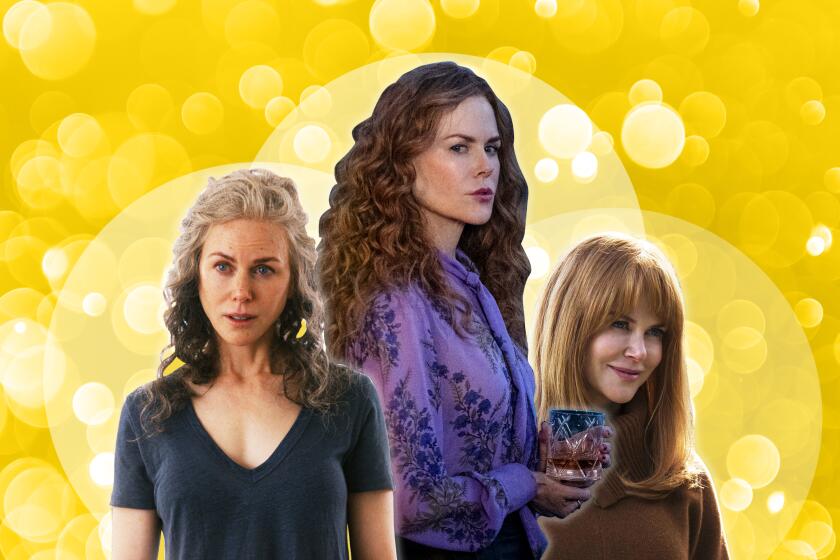Need a really good mystery to watch? HBO’s new crime drama is just the ticket
- Share via
In the well-wrought “Mare of Easttown,” which begins Sunday on HBO, Kate Winslet plays Mare Sheehan, a police detective in a Pennsylvania small town dealing with the death of a teenage girl and the possibly related disappearance of another a year before. In some surely unintended way, it feels like a corrective to the glamorous, shallow, uptown hokum of “The Undoing” — HBO’s most-watched show of 2020, so I use the term “corrective” advisedly and personally. From the five episodes available for review, out of seven, the limited series also seems liable to eschew the artier conceits of the network’s “True Detective” in favor of something more workaday, though one never knows what surprises an additional two hours of television might bring.
Along with investigating “the burglaries and the overdoses and all the really bad crap that goes on around here,” things closer to home are adding stress to Mare’s life. Her ex-husband (David Denman) is about to remarry and has moved into a house bordering hers; her son is dead, by his own hand, and the mother of his child (Sosie Bacon), freshly out of rehab, wants to claim the little boy back from Mare, who worries that his “trouble focusing on tasks” is a sign of worse mental problems to come. Also living with Mare are her mother, Helen (Jean Smart), a verbal sparring partner, and her daughter Siobhan (Angourie Rice), who has a modish haircut and a band (in which she is the dependable member). Their relationship is colored by Mare’s determination to get Siobhan into a good college and, significantly, out of Easttown, and by Siobhan’s feelings about her late brother.
Twenty-five years earlier, as a member of her high school basketball team, Mare made a shot that cinched a state championship, and as the series gets underway, there is a ceremony to celebrate it, a device that seems intended mostly to suggest that some people get out of town and some never do and that glory days, well, they’ll pass you by. (And good riddance.)
“Must have been some shot,” says Richard (Guy Pearce, reuniting with his “Mildred Pierce” costar Winslet), who strikes up a conversation with Mare in a bar later that night.
“Most places, no,” she replies. “‘Round here, yeah.”
Richard, who has moved to town to guest lecture at a local college, wrote one award-winning novel years ago. (“They made a TV movie out of it in the ‘90s starring Jill Eikenberry” is one of the year’s great lines.)
“Sounds fancy,” says Mare.
“In some places, yeah,” Richard replies. “Around here, not so much.”
Since “Big Little Lies,” the Oscar winner has brought prestige to a medium eager for it — and inspired a wave of stories about affluent women on the verge.
Is he here as a love interest or something more? That he’s not only a writer but also a writer who has failed to write more than that one book, and is played by Pearce, the series’ marquee name alongside Winslet and Smart (continuing the upward trajectory of what it may be premature to call her late career), sends up a red flag — or is it a red herring? (That Richard’s hair is edging untended toward a mullet doesn’t help his case.) There are a couple of clerics in the mix as well (James McArdle and Neal Huff), a line of work that’s become a magnet for suspicion in these sorts of stories.
The real question is whether Mare, an unhappy person stuck in an unhappy place, might become even a marginally happier one, a matter quite apart from her catching a killer. She regularly begins a scene sucking on an e-cigarette, if that’s what it is, and drinks, when she drinks, with some determination — though there is also no suggestion that this causes problems at home or at work. Indeed, she’s good at her job, and dedicated to it, though she tends to bend rules and ignore orders. (In some stories, of course, perhaps including this one, that is the definition of a good cop.)
It does seem for a while that we are embarking upon a familiar dreary portrait of a down-market community in which nearly every character with more than a dozen lines is drunk or on drugs, or at angry odds with spouses, parents, kids or colleagues, or hiding some dark or darker secret. Or just plain mean. That is all in good supply, and so one clutches gratefully at any display of functional, normal life. I have checked, and there is plenty of normalcy in the nonfictional Easttown Township, near where “Mare” screenwriter Brad Ingelsby (the Ben Affleck alcoholism-and-basketball film “The Way Back” and the missing-girl drama “American Woman”) grew up. And there is just enough of it in his miniseries to keep a viewer hanging in.
There is nothing sensational here, but I watched five episodes in a row with growing interest and found little occasion to talk back to the screen. Suspense when it comes is effective; there are a couple of genuine shocks and, for all that the story might seem to go where you expect, some care has been taken to arrange things so that even when you can see what’s coming, you might miss what’s coming behind it. I can’t help but wonder whether its commonplace setting and the air of sadness licking into most every corner will cost it an audience; “The Undoing” was not much good, but as a shiny bauble, it’s an easy sell.
That isn’t to say that Ingelsby manages — or tries? — to avoid every trope or cliché in the Big Box of Detective Story Tropes and Clichés, prime among them the well-worn Unwelcome New Partner. Here, it’s a detective “from county” named Colin Zabel (Evan Peters) — in honor perhaps of series director Craig Zobel (“The Hunt”) — who earned a reputation solving a cold case. He’s a chirpy sort who says, “Jinx, you owe me a Coke” when he and Mare say the same thing at the same time, and whose outstretched hand she pointedly ignores.
“Teamwork makes the dream work,” says Craig.
“Oh, my God,” says Mare.
“You’re the chef, I’m the sous chef — what are we cooking?”
“Stop talking.”
She’ll treat him with aggressive passive aggression. Until, of course, she won’t.
The actor, once known for romantic comedies, has taken on darker roles of late — including as a potentially dangerous version of himself in HBO’s “The Undoing.”
Wearing her Pennsylvanian American accent, Winslet makes you believe in Mare as a person and not a part; the actress, who spends much of the opening episode limping, does not mind looking bedraggled, and you can feel the world weighing on her, in a subtle bodily way, and sense her pressing back. Once or twice she’ll get to clean up enough to remind you that she’s a movie star, and here and there she gets to be funny, if not necessarily good-humored.
Will it matter who did it? (“Who did what?” is also a question that applies.) Sure, for a few minutes, out of the hundreds of minutes this story lasts. (It will be the person you suspect, or the person you don’t want it to be, or the random person flown in at the eleventh hour. It’ll be someone.) Our compulsive desire for answers is what can keep us watching even a bad mystery, but in a really good mystery, the journey is what matters, the scenery, the people you meet: the detective, the bystanders, the suspects, all but one or two of whom will turn out not to be the killer. And “Mare of Easttown” makes those other minutes feel well spent.
‘Mare of Easttown’
Where: HBO
When: 10:05 p.m. Sunday
Rating: TV-MA (may be unsuitable for children under age 17)









